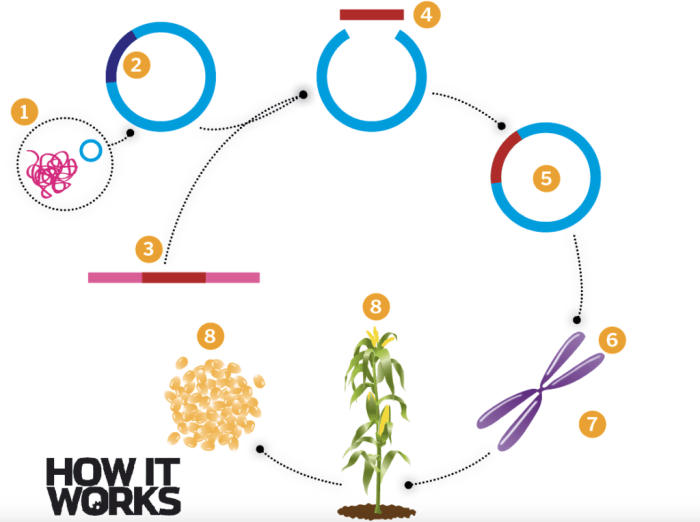Genetically engineered bacteria are being developed to produce alternative fuels – Genetically engineered bacteria are poised to revolutionize the energy landscape by unlocking the potential of alternative fuels. This transformative technology offers a sustainable and cost-effective solution to meet the world’s growing energy demands.
Harnessing the power of genetic engineering, scientists are tailoring bacteria to produce a wide range of alternative fuels, including biofuels, hydrogen, and renewable diesel. These fuels hold immense promise for reducing greenhouse gas emissions and mitigating the environmental impact of traditional fossil fuels.
Introduction

Genetically engineered bacteria are microorganisms whose genetic material has been altered to give them new or enhanced capabilities. Alternative fuels, on the other hand, are fuels that are not derived from petroleum or natural gas. They are often considered to be more sustainable and environmentally friendly than traditional fossil fuels.
One of the potential applications of genetically engineered bacteria is to produce alternative fuels. This approach offers several advantages, including the ability to use renewable feedstocks, the potential for cost-effectiveness, and the ability to produce fuels that are compatible with existing infrastructure.
Benefits of Using Genetically Engineered Bacteria
- Use of renewable feedstocks:Genetically engineered bacteria can be designed to use a wide range of renewable feedstocks, such as biomass, to produce fuels. This reduces the reliance on fossil fuels and promotes sustainability.
- Potential cost-effectiveness:The production of alternative fuels using genetically engineered bacteria has the potential to be cost-effective compared to traditional methods. This is because bacteria can be grown and fermented relatively inexpensively, and they can produce fuels at high yields.
- Compatibility with existing infrastructure:Genetically engineered bacteria can be designed to produce fuels that are compatible with existing infrastructure, such as gasoline and diesel engines. This makes it easier to transition to alternative fuels without the need for major changes to vehicles or fuel distribution systems.
Challenges and Limitations
- Genetic stability:Ensuring the genetic stability of genetically engineered bacteria is crucial to maintain their ability to produce fuels consistently and safely. Mutations or other genetic changes can lead to decreased fuel production or the production of harmful byproducts.
- Environmental concerns:The release of genetically engineered bacteria into the environment raises potential environmental concerns. It is important to assess the potential risks and develop strategies to mitigate any negative impacts.
- Ethical considerations:The use of genetically engineered bacteria for fuel production raises ethical concerns related to the modification of living organisms and the potential impact on biodiversity.
Current Research and Advancements, Genetically engineered bacteria are being developed to produce alternative fuels
Research is ongoing to address the challenges and limitations associated with using genetically engineered bacteria for fuel production. Scientists are developing new genetic engineering techniques to improve the stability and efficiency of bacteria. They are also exploring the use of synthetic biology to design bacteria with entirely new capabilities for fuel production.
Promising approaches include the use of metabolic engineering to optimize the metabolic pathways involved in fuel production and the development of novel bioreactors to improve the efficiency of fermentation processes.
Future Prospects and Applications
Genetically engineered bacteria have the potential to revolutionize the production of alternative fuels. As research continues and the challenges are overcome, this technology could lead to the development of sustainable and cost-effective fuels that can help to reduce our reliance on fossil fuels.
In the future, genetically engineered bacteria could be used to produce a wide range of alternative fuels, including biofuels, bio-oils, and hydrogen. These fuels could be used to power vehicles, generate electricity, or heat homes and businesses.
Common Queries: Genetically Engineered Bacteria Are Being Developed To Produce Alternative Fuels
What are genetically engineered bacteria?
Genetically engineered bacteria are bacteria whose genetic material has been modified to alter their traits or capabilities.
How are genetically engineered bacteria used to produce alternative fuels?
Scientists modify the genes of bacteria to enable them to produce specific enzymes or proteins that convert biomass or other feedstocks into alternative fuels.
What are the advantages of using genetically engineered bacteria for fuel production?
Genetically engineered bacteria offer advantages such as cost-effectiveness, scalability, and the ability to produce fuels from a variety of feedstocks.


